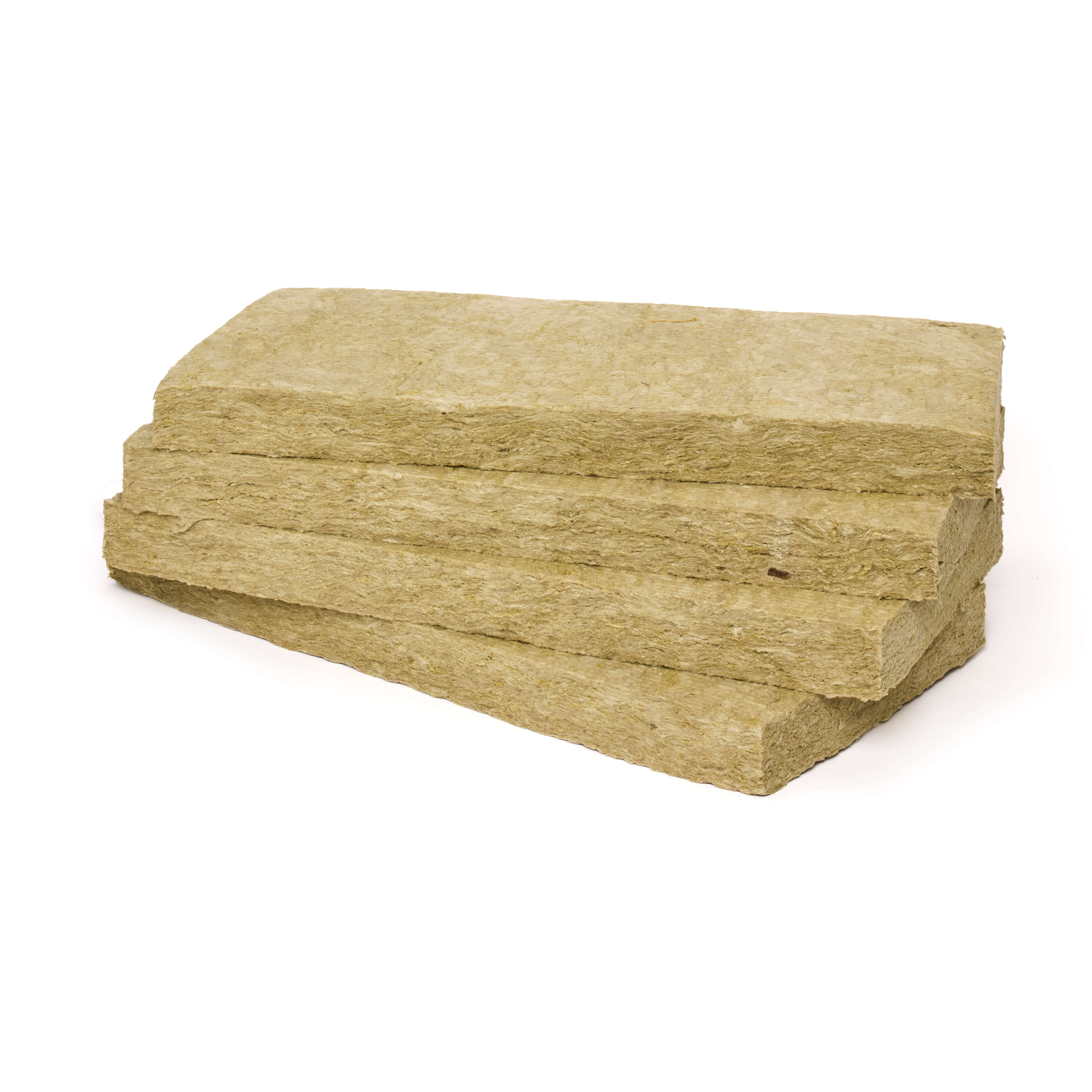Rockwool Flexi Slab
(6 Products)Rockwool Flexi slab is a mineral-wool infill made for stud walls, floors, and pitched roofs. The core is spun from volcanic rock, so it won’t burn, yet it is shot through with microscopic air pockets that curb heat loss and muffle sound. In effect, one product answers three separate targets: thermal, acoustic, and fire.
What Is Rockwool Flexi Insulation?
Rockwool Flexi is a semi-rigid insulation board manufactured from molten basalt spun into fine fibres and bonded with a low-emission resin.
One long edge is engineered with a “flexi strip”: a 10-15 mm zone of softer density that compresses against timber or metal studs, holding the slab under constant friction.
This self-supporting detail eliminates the need for supplementary fixings and delivers a continuous, gap-free layer, which is critical for both thermal and acoustic performance calculations.
You can slot the slabs into nearly every part of a house: between pitched-roof rafters, behind cladding in timber-frame walls, inside stud partitions, across intermediate floors, in separating floors and walls, and even beneath a suspended timber ground floor.
Flexi Patented Edge
Rockwool Flexi earns its name from a built-in flexible edge: a compressible “spring” that runs the full length of one side.
As the slab slides between studs it flexes, then rebounds to grip the timber or metal, locking itself in place without extra fixings.
This firm, gap-free fit stops heat and sound sneaking through joints and keeps the insulation tight and stable for the building’s entire service life.
Applications
- Interior timber or steel partition walls
- Interior timber frame floors
- Interior timber frame ceilings
- Acoustic ceilings and partition panels
- I-joist interior partitions
- Party walls
Benefits
- Fire Safety: Made from non-combustible stone wool, these slabs carry an A1 rating under the Euroclass system (the highest classification available). That means they won’t catch fire, won’t spread flame, and won’t produce significant smoke, even in high-temperature conditions.
- Moisture Resistance: The fibres don’t absorb water, so damp conditions won’t compromise the slab’s shape or performance. This also helps prevent the growth of mould or bacteria over time, especially in areas where ventilation is limited.
- Sustainability: Made using natural stone and includes recycled content, typically between 16% and 40%, depending on the batch. Its durability and lifespan contribute to a lower environmental impact over time, especially when compared to synthetic alternatives that need replacing more often.
- Density and Acoustic Performance: Compact fibre structure offers excellent sound insulation. Heavier than most insulation products in its class, it performs especially well in internal partitions and separating floors where airborne noise is a concern.
- Thermal Properties: Performs reliably across thicknesses. At 50mm and 100mm, the thermal conductivity is 0.038 W/mK. In thicker 140mm slabs, that improves slightly to 0.035 W/mK.
- Installation Fit: Flexi is the only product in the Rockwool range with a flexible edge. This small detail makes a big difference: it compresses slightly during installation, then expands to hold the slab in place between timber or metal studs, helping create a tight seal without fixings.
Frequently Asked Rockwool Flexi Slab Questions
Are Rockwool Flexi Slabs Fireproof?
Rockwool Flexi slabs are classed A1 on the Euroclass scale, which means they achieve the highest rating for non-combustibility and fire performance, and are completely non-flammable.
If you were to hold a blowtorch next to a piece of Rockwool insulation, it might begin to glow but it will not catch fire or melt, making it an excellent fire barrier solution.
Are Rockwool Flexi Slabs Waterproof?
Flexi slabs are waterproof, making them perfect for homeowners who live in high rainfall areas. If a large amount of water comes into contact with the slabs, the exterior will repel it and the water will simply drain away.
Even if the slabs become wet, they can be dried and still retain the same thermal and acoustic properties. However, whilst they are water-resistant, they are not resistant to water vapours in the air.
Are Rockwool Flexi Slabs Resistant to Mould?
Flexi slab insulation does not promote the growth of mould. There are no organic materials inside the slabs, which means that there is no source of food for mould to grow on.
Mould can have a negative impact on the structural integrity of your insulation and pose a threat to the long-term benefits associated with insulating your property.
Rockwool Flexi insulation has been tested against ASTM C1338. This is one of the standard tests that regulators use to assess whether or not an insulation material will grow mould. Rockwool Flexi slabs have been proven to have zero fungal growth.
How to Cut Rockwool Flexi Slabs?
Cutting Flexi follows the same routine as the rest of the Rockwool range. Mark your dimensions clearly on the face of the slab, lay it flat on a stable surface, and run a coarse-tooth insulation knife, or even a long bread knife, through the line in one smooth pass.
The mineral wool has just enough give that the blade glides without tearing, so an accurate cut is easy once the layout is set.
Slip on light gloves to keep fibres off your skin and wear goggles to stop stray dust reaching your eyes. Open a door or set up extraction so the air stays clear. If space is tight or you’re unsure of the technique, calling in a trained installer is the safest route.



